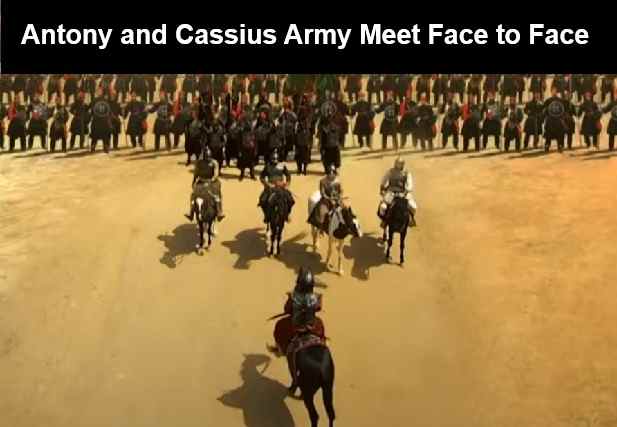Julius Caesar Act-5 Scene-1 Context Questions: ICSE Class 10 Eng Drama Context Questions are very common in English Drama because it help in the evaluation of skill among students . Visit official website CISCE for detail information about ISC Board Class-10 English.

Julius Caesar Act-5 Scene-1 Context Questions: ICSE Class 10 Eng Drama
| Board | ICSE |
| Subject | English |
| Class | 10 |
| Book Name | Julius Caesar |
| Session | 2024-25 |
| Topics | Act-4, Scene-1 |
| Question Type | Context Questions |
Context Questions
Julius Caesar Act-5 Scene-1 ICSE Class 10 workbook Solutions
Que: Read the extract given below and answer the questions that follow
OCTAVIUS They mean to w.. …… ….. …. wherefore they do it
Que-1: What reasons does Antony give to Octavius for their enemies attacking them first?
Ans: Antony suggests that their enemies aim to demonstrate bravery and courage by attacking first, intending to create an impression of strength and valor before any demands are made of them.
Que-2: What news does a messenger bring after the extract? What does Antony suggest to Octavius? How does Octavius disagree with Antony? Give two instances.
Ans: The messenger informs that the enemy approaches in a bold display, ready for battle. Antony suggests a strategic positioning for their forces, recommending Octavius lead the battle softly on upon the left hand of the field. Octavius refused, choosing instead to take the right hand.
When Antony questions “Why do you cross me in this exigent?”, Octavius replies “I do not cross you, but I will do so.”
Que-3: What military strategy was followed? What was Brutus’ argument for following the strategy?
Ans: The military strategy involved direct opposition and parley before battle. Brutus advocated for discussion (“Words before blows”), suggesting that resolving conflicts through dialogue is preferable to violence, reflecting his belief in the power of reason over force.
Que-4: How does Antony taunt Brutus? How does Antony describe the unethical manner in which the conspirators attacked Caesar? Who does he compare them to?
Ans: Antony taunts Brutus by highlighting the hypocrisy (double role) in his actions, specifically Brutus’s declaration of loyalty to Caesar (“Long live, hail, Caesar!”) while plotting his death. He describes the conspirators’ attack on Caesar as cowardly and deceitful, comparing them to animals (apes, hounds) and slaves.
Que-5: How does Octavius show better capability and practicality compared to Antony as he stands arguing with the conspirators?
Ans: Octavius demonstrates through his decisive leadership and clear command in the battlefield arrangement. His insistence on choosing his battle position, despite Antony’s suggestion, shows a practical approach to military strategy, focusing on tactical advantage over personal disagreement
CASSIUS — Messala This is my birthday, … … .. thy hand Messala
Que-1: After the extract, Cassius narrates two contradicting sights he saw. What were they? What does he feel the sights symbolize?
Ans: Cassius express seeing mighty eagles followed by ominous birds like ravens, crows, and kites. He illustrate this transition as a bad omen, symbolising doom and defeat, indicating a shift from a sign of strength to an indication of impending disaster.
Que-2: Give the meanings of the lines that follow the extract: ‘As we were sickly prey their shadows seem / A canopy most fatal’
Ans: lines convey Cassius’s feeling of the unfortunate birds casting shadows over their army, symbolizing death and defeat. The “canopy most fatal” metaphorically represents a looming threat of disaster, suggesting their army is vulnerable and marked for destruction.
Que-3: What character traits of Cassius are seen? How does he appear to have a different bent of mind from what he had earlier in the play?
Ans: Cassius shows a blend of superstition and pragmatism, contrasting with his earlier rational and manipulative demeanor. His belief in omens and his emotional response to the situation reveal a more vulnerable and introspective side, acknowledging the influence of fate and the gods.
Que-4: What philosophy had Cassius followed earlier? Why does he discard this philosophy? What does this show of Cassius?
Ans: Cassius previously adhered to Epicureanism, which generally disregarded omens and the supernatural. He discards this philosophy due to the ominous signs he interprets as warnings of defeat, reflecting a change in his belief system influenced by fear and uncertainty, indicating a significant personal transformation.
Que-5: State the reasons for Cassius’ downfall where Brutus is concerned
Ans: Cassius’ downfall can be attributed to his shift in beliefs, the emotional toll of the war, and his reliance on Brutus’s leadership and moral compass. This dependency, coupled with strategic errors and misinterpretations of omens, contributes to his tragic end.
CASSIUS-Then, if we lose the battle, …. … Brutus will go bound to Rome
Que-1: What has Brutus just said to make Cassius utter these words?
Ans: Brutus expressed his favors against suicide, advocating patience and acceptance of fate, contrasting with the notion of actively preventing destiny through self-harm. This prompts Cassius to question Brutus’s willingness to face public humiliation in case of defeat.
Que-2: What Roman practice is referred to by Cassius as a result of losing a battle?
Ans: Cassius refers to the practice of leading defeated generals in a triumphal parade through Rome, a form of public humiliation and acknowledgment of their defeat.
Que-3: Explain “That ever Brutus will go bound to Rome?” How does Brutus’ words show that he is truly honorable?
Ans: Refusal of Brutus to be paraded as a captive in Rome showing his deep sense of honor and dignity. He would rather end the battle and the cause for which he fought than suffer the indignity of being led in triumph.
Que-4: What was the significance of the Ides of March? What was its effect later in the play?
Ans: The Ides of March marks the day Julius Caesar was assassinated, a pivotal event orchestrated by Brutus, Cassius, and other conspirators. Throughout the play, this act haunts the conspirators, with Caesar’s ghost symbolizing the moral and political repercussions of their deeds, ultimately leading to their downfall.
Que-5: Do Brutus and Cassius meet again? If not, why?
Ans: No, Brutus and Cassius never meet again because they both die in the ensuing battle.
— End of Julius Caesar Act-5 Scene-1 Context Questions :–
Return to :– ICSE Class -10 Drama: Julius Caesar Workbook Solutions :–
thanks
Please share with your friends if helpful


